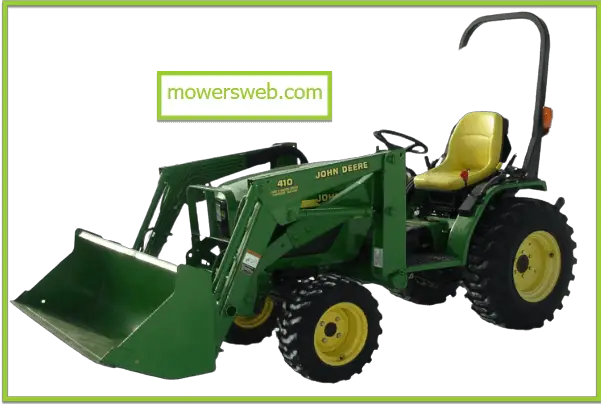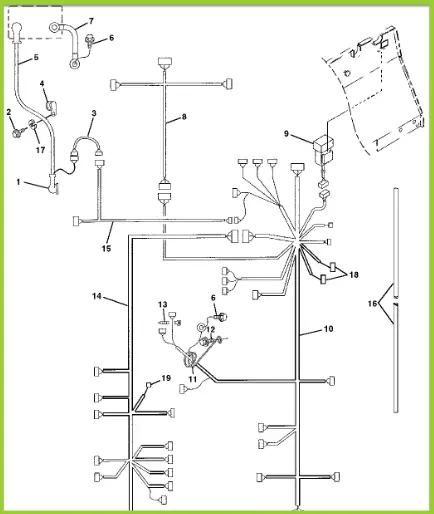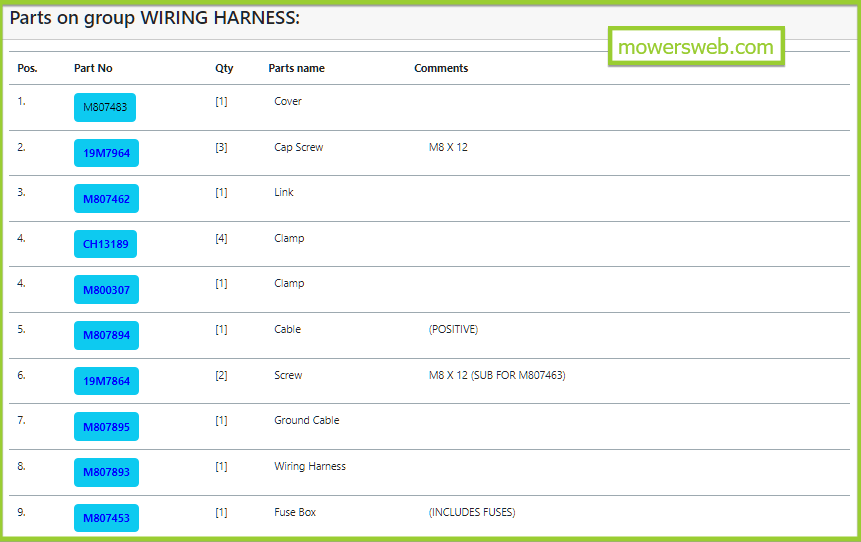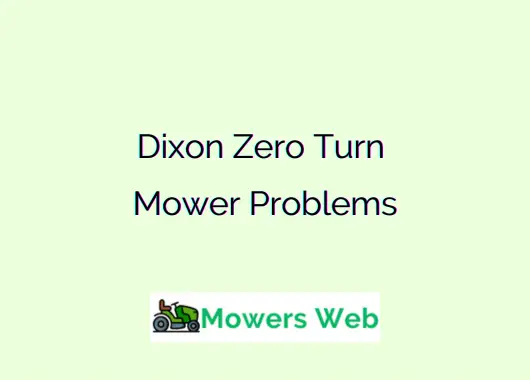If you’re looking for a reliable tractor for small farms, the John Deere 4100 might be on your radar. However, like any piece of machinery, it’s not perfect.
In this blog post, we’ll discuss some of the most common John Deere 4100 problems and how to troubleshoot them.
Let’s dive in.

John Deere 4100 problems
1. Battery Issues
The John Deere 4100 has a relatively small battery, and if it’s not maintained properly, it can quickly run out of juice.
This can result in starting problems or even engine failure.
To prevent this issue, be sure to keep the battery charged and clean. If you notice that the battery is not holding a charge, it may be time for a replacement.
2. Hydraulic Leaks
Another common problem with the John Deere 4100 is hydraulic leakage.
This can happen for a variety of reasons, including worn or damaged seals, loose fittings, or damaged hoses.
If you notice any hydraulic fluid leaking from your tractor, it’s important to address the issue immediately.
Otherwise, it can cause damage to the tractor’s engine or other components.
3. Engine Problems
The John Deere 4100 is known for having engine problems, particularly with the fuel injection system.
If the fuel injection system is not properly maintained, it can cause the engine to run poorly or not at all.
Additionally, the fuel filters can become clogged, which can cause the engine to stall or run rough.
To prevent these issues, be sure to keep up with regular maintenance, including changing the oil and filters.
4. Transmission Issues
The John Deere 4100 is equipped with a hydrostatic transmission, which is known for being reliable and efficient.
However, like any transmission, it can develop problems over time. One common issue is slipping or jerky movement,
which can be caused by low fluid levels or worn-out components.
To prevent transmission issues, be sure to check the fluid levels regularly and address any leaks or other problems immediately.
5. Electrical Problems
The John Deere 4100’s electrical system can be prone to problems, particularly with the ignition switch and starter solenoid.
If these components are not functioning properly, it can cause starting problems or prevent the engine from turning over at all.
To prevent these issues, be sure to keep up with regular maintenance and replace any worn or damaged components.
Read John Deere X590 Problems (Common Issues and Solutions)
6. Steering Issues
Finally, the John Deere 4100 can develop steering problems over time.
Tie rod ends or ball joints, for example, maybe the culprits of this wear and tear in the steering system.
If you notice that your tractor is difficult to steer or is pulling to one side, it’s important to address the issue immediately.
Otherwise, it can cause damage to the tractor’s tires or other components.
| Problem | Possible Causes | Solutions |
|---|---|---|
| Battery Issues | Dead battery, low charge, dirty battery | Keep battery charged and clean, replace if necessary |
| Hydraulic Leaks | Worn or damaged seals, loose fittings, damaged hoses | Address the issue immediately, replace worn or damaged components |
| Engine Problems | Fuel injection system issues, clogged fuel filters | Keep up with regular maintenance, change oil and filters |
| Transmission Issues | Low fluid levels, worn components | Check fluid levels regularly, address leaks or other problems immediately |
| Electrical Problems | Worn or damaged components, such as ignition switch or starter solenoid | Keep up with regular maintenance, replace worn or damaged components |
| Steering Issues | Worn or damaged components in the steering system | Address the issue immediately, replace worn or damaged components |
John Deere 4100 Wiring Diagram
For a John Deere 4100 tractor, a wiring diagram specific to that model would show the electrical connections for various components such as the battery, ignition switch, starter motor, lights, and other electrical devices.
It would provide information about wire colors, wire gauges, and the paths that the wires take throughout the tractor’s electrical system.


John Deere 4100 Fuel Filter
[affiliatable id=’183238′]
Read John Deere Fuel Filter Not Full(3 Quick Ways To Fix)
How to Fix John Deere 4100 Problems
To properly diagnose the issue. In some cases, it may be necessary to take your John Deere 4100 to a professional mechanic for repair.
However, there are also some steps you can take to troubleshoot and fix the problem on your own.
1. Battery Issues
For battery issues, you can check the voltage with a multimeter to see if it’s holding a charge.
If the battery is not holding a charge, you may need to replace it.
Additionally, you can clean the battery terminals and connections to ensure a proper connection.
2. Hydraulic Leaks
If you notice hydraulic leaks, you should first identify the source of the leak.
This can be done by inspecting the hoses and fittings for damage.
Once you’ve identified the source of the leak, you can replace any worn or damaged components.
3. Engine Problems
For engine problems, it’s important to keep up with regular maintenance, including changing the oil and filters.
Additionally, you can check the fuel injection system for any issues, such as clogged injectors or damaged components.
If you’re unsure of how to perform these tasks, it’s best to consult the owner’s manual or a professional mechanic.
4. Transmission Issues
To prevent transmission issues, you should check the fluid levels regularly and address any leaks or other problems immediately.
Additionally, you can inspect the transmission components for wear or damage and replace any worn or damaged parts.
5. Electrical Problems
For electrical problems, you can check the wiring and connections for any damage or corrosion.
If you notice any issues, you can replace the damaged components or clean the connections.
Additionally, you should keep up with regular maintenance, including checking the battery and charging system.
6. Steering Issues
For steering issues, you should inspect the steering components, such as tie rod ends and ball joints, for any wear or damage.
If you notice any issues, you can replace the worn or damaged parts.
You can also check the alignment of the wheels to ensure they are properly aligned.
Read 10 Common John Deere S240 Problems(With Solution)
John Deere 4100 Tractor
The John Deere 4100 is a small utility tractor that John Deere produced. It is part of the 4000 Compact Utility Tractor series.
The 4100 model was introduced in the late 1990s and remained in production for several years.
Here are some key features and specifications of the John Deere 4100 tractor:
| Feature | Description |
|---|---|
| Engine | Diesel engine |
| Horsepower | Approximately 20 HP |
| Cooling | Liquid-cooled |
| Transmission | Hydrostatic |
| Power Take-Off | Rear PTO |
| Three-Point Hitch | Yes |
| Operator Comfort | Comfortable seat, ergonomic controls, well-positioned instrument panel |
| Attachments and Implements | Compatible with various attachments and implements |
Read 11 Reasons Why John Deere D110 Won’t Start(Fixed)
FAQ
What is the John Deere 4100?
The John Deere 4100 is a compact utility tractor designed for use in landscaping, farming, and other outdoor tasks.
What are some common problems with the John Deere 4100?
Common problems with the John Deere 4100 include battery issues, hydraulic leaks, engine problems, transmission issues, electrical problems, and steering issues.
Can I fix the problems with my John Deere 4100 on my own?
While some problems can be fixed on your own, it’s important to properly diagnose the issue and ensure you have the necessary skills and tools to perform the repair.
In some cases, it may be best to consult the owner’s manual or a professional mechanic for assistance.
How often should I perform maintenance on my John Deere 4100?
John Deere recommends performing maintenance on your 4100 at regular intervals, such as every 50 or 100 hours of operation.
This includes tasks such as changing the oil and filters, inspecting and adjusting the belts and hoses, and checking the fluid levels.
What is the best way to prevent problems with my John Deere 4100?
The best way to prevent problems with your John Deere 4100 is to follow the manufacturer’s recommendations for maintenance and inspection.
This includes regular maintenance tasks and addressing any issues immediately when they arise.
Also, operating your tractor safely and within its capabilities can help prevent problems from occurring.
Read John Deere Z915E: 4 Common Problems and How to Fix Them
Final Remarks
The John Deere 4100 is a reliable tractor, but it can develop problems over time.
By following the manufacturer’s recommendations for maintenance and troubleshooting, you can prevent and address these issues.
If you’re unsure of how to perform any maintenance or repairs, it’s best to consult the owner’s manual or a professional mechanic.




